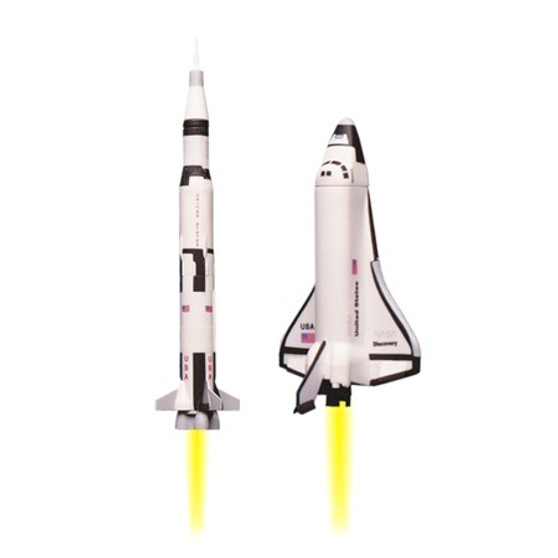Quest Flying Model Rocket Kit Micro(MX) Saturn V & Space Shuttle Orbiter 5643
Ready to Fly Micro Model Rockets twin pack
Perfect for Backyard Launching
Can be launched over and over again
Reaches altitudes up to 200 feet
Includes 2 display stands
Recommended for ages 10 and up
Skill Level: Ready to Fly
Made in China
Space Shuttle Orbiter:
Recovery: Streamer
Fin Type: Plastic
Length: 3.5"
Diameter: 0.51"
Engines (Motors): Quest Micro Maxx Only
Altitude (Estimated Max): 200 feet
Saturn V:
Recovery: Streamer
Fin Type: Plastic
Length: 5.75"
Diameter: 0.5"
Engines (Motors): Quest Micro Maxx Only
Altitude (Estimated Max): 200 feet
Use our Semroc Micro Maxx Launch Rod and Holder 9080 to launch these rockets
Model Rocket Kits are rated by Skill Level
RTF Ready to Fly
1 Beginner
2 Intermediate
3 Advanced
4 Expert
5 Master
If you are just starting in the hobby start at the beginner level and move up from there at your own pace.
What is needed to build and fly
All model rockets come in kit form that require assembly. The materials are primarily cardboard tubes, balsa or plastic fins and nose cone. Materials will vary by model and are typically specified in the description of each kit.
Additional supplies will be necessary to build and finish your model rocket kit and may include:
Scissors, Hobby Knife
Ruler
Wood Glue, Model Cement or CA(Super Glue)
Sandpaper
Masking Tape
Finishing Supplies like:
Wood Filler
Sealer/Primer
Paint
Launching Equipment and Supplies like:
Recovery wadding
Launch Pad
Launch Controller
Power supply
Model Rocket Motors and Igniters
A safe place to fly using guidelines from the National Association of Rocketry Safety Code















